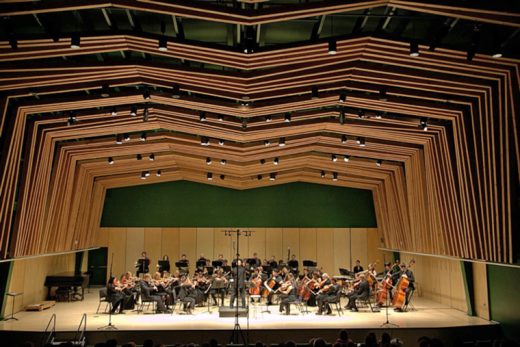Idyllwild Arts Academy Orchestra Concert
Saturday, April 27, 2019, 7:30 p.m.
Lowman Concert Hall, IAA Campus

The occasion of the final orchestral program of Idyllwild Arts Academy’s year was a pleasant enough evening, with only light breezes interrupting an otherwise warm, ambient environment, and further banishment of the latest off-Hill human frailties (nefarious and otherwise) was certainly in evidence as this reviewer entered the refreshing atmosphere of Lowman Concert Hall.
Far from the madding crowds of Pacific Crest Trail hikers and paraphernalia, as well as with renewed appreciative auditory anticipation, derived mainly from a brief scanning of Damon Krukowski’s latest book “Ways of Hearing,” whetting the sonic appetite in earnest.
In addition, the scheduled program followed on the 125th anniversary of the birth of the eminent musical biographical authority Nicolas Slonimsky, and reflected on the eclectic approach he evinced to musical forms both classical and modern.
So it was with a renewed breath of fresh aural air that the program would start with two works from the 1930s (“early modern,” if you will) featuring performances by IAA concerto competition winners.
The opening movements of Maurice Ravel’s “Piano Concerto in G Major” and of Serge Prokofiev’s “Violin Concerto #2 in G Minor” proved to be a study not only in solo virtuosity on the part of pianist Yifang “Demi” Rong and of violinist Alexander Babin, but on the orchestral control exhibited by conductor Scott Hosfeld over the contrasting courses in both works.
From the opening percussive crack of the Ravel, through the sonorous beginning and closing of the Prokofiev movement, dexterity as well as virtuosity was clearly the watchword for the presentation, and the orchestra’s sections also were clearly defined by a dexterous manipulation of controlled effects, with the strings (as per usual) in force in such definition.
Following these two, all-too-short excursions into the mid-20th century idiom, Maria Newman’s 2019 work “Entomology” (a reworking of her chamber piece of the same title, for larger orchestral forces) proved for this listener a return to the natural world of sound.
Though Ms. Newman’s intent was to focus on the life of the bee (from the prefatory quote from Emily Dickinson’s “Fame is a bee”), it also seemed an enhanced portrayal of the buzz and bustle of nature en masse, projected in varied forms that were not necessarily all insectoidal, but all integrated as a unified whole. Once again, Mr. Hosfeld’s exemplary conducting brought all together in a wondrous display of orchestral management.
The short intermission that followed, with a congratulatory presentation by orchestral manager Heather Netz for the departing conductor Hosfeld and department chair Chris Reba (with appropriate floral tributes), as well as for the 13 departing senior members of the orchestra, was succeeded by an exemplary integral performance of Ludwig van Beethoven’s “Symphony #6 (Pastoral) in F Major,” which proved a valedictory for both conductor and performers.
Even though the first movement sounded a bit too fast for this listener, the succeeding portions had the proper contour for the sonic landscape the composer definitely intended for his 19th century auditors, as well as generations to come.
The andante movement’s depiction of a brookside scene (complete with bird calls) proceeded admirably and logically, to be followed by a progression from merrymaking, through a sudden storm (with more than appropriate fierceness from the timpanist) and culminating in a joyful recognition of the blessings of the natural world by the populace, signaled an ending as well as a renewal of aural spirituality for all attentive creatures.
Both Mr. Krukowski and Professor Slonimsky would have joined together in the mutual approbation which followed from the audience, and one can only aspire to successes in performance from all concerned.











